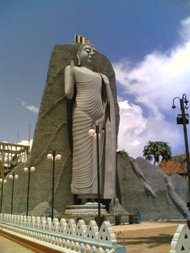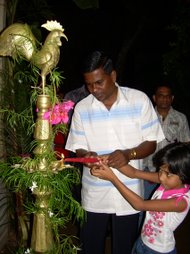Strictly speaking you cannot choose a "Montessori" but only a Montessori school. It may come as a surprise or shock to many in Sri Lanka that less than 5% of the so-called ‘ Montessoris" show any evidence of following or adhering to Montessori education. The remainder, at best, are play groups offering simple shared experiences and activities relying heavily on colouring, pasting and copy-writing of A B C.: Devoid of materials and equipment, and not having a real understanding of early childhood education, these pre-schools achieve only minimal standards. Should you question parents on how they choose a "Montessori" for their children, you may find that a snazzy and cute uniform, emphasis on A B C, and a concert that has been practiced interminably, complete with fancy costumes - has more influence than child-centered education.
Maria Mont6essori died in 1952. She was born in Italy and trained as a doctor working in a psychiatric clinic for children with learning difficulties. From this she developed her ideas that children under six years are at their most receptive. The education methods she evolved encourages children to learn about the world around them through exploration. They are given the freedom to move around, manipulate and touch, especially through the "educational toys" she designed and activities that support this approach. In this way the children acquire self-direction, skills, responsibility, competence and confidence. The development of social/emotional skills took precedence over early reading and writing. The role of the teacher is to guide and encourage rather than teach, so that achievement and not failure is dominant. Her emphasis on children working alone and silently, focused on a task, is a common criticism of her philosophy. Montessori discouraged children’s free play or developing their own ideas as these lacked a learning focus and this also is a valid criticism of her approach. Paramount to the Montessori classroom is a carefully planned environment, a mixed age structure and minimal group activities.
Few people realize that then term "kindergarten" (garden for children) emanates from the pioneering work of Friedrich Froebel who died in 1852. He opened his first kindergarten in 1837 for three to seven year olds from which his ideas spread across the world. Learning outdoors using the natural environment is as important as indoor activities. He stressed that children should not be confined to desks but able to move around freely. Symbolic and imaginative play such as dressing-up, playhouse, dolls and puppets are part of the learning process as are finger rhymes and songs. Children need to experience and discover for themselves in a child-centered environment rather than a prescriptive series of lessons.
The contribution these two pioneers made to early childhood education cannot be underestimated. Neither should the contributions of Rudolph Steiner who died in 1925, Margaret McMillan (1931) and Susan Isaacs (1948). It was Margaret McMillan who developed the concept of the nursery school and her methods incorporated the ideas of Montessori, Steiner, and Froebel. Her first open-air nursery school opened in London in 1914. While these early educators evolved specific methodologies, the emphasis on child-centered activities and discovery in a non-formal setting is common to all.
More recently, psychologists such as Jean Piaget, Lev Vygotsky, Jerome Brunner and Sigmund Freud, have contributed their research findings in the way children think, feel, and understand at different stages of their development. Play, exploration and self discovery often achieve more learning in the early years than formal teaching.
Despite the exciting contributions to early childhood education and development made by these and others, all too often the titles "Montessori", "kindergarten", "nursery school" and "pre-school" have been high jacked or borrowed by private and government institutions offering far less than these names should imply. This is especially evident in Sri Lanka, where there is minimal understanding or supervision over early childhood education.
Ideally the pre-school should be eclectic and include the ideas of many educational pioneers. Nowadays, most pre-schools and primary schools in developed countries have been influenced by writers and practitioners who developed the ways we now accept as to how children develop and learn. Despite this greater insight and understanding into child development, the majority of pre-schools in Sri Lanka have satisfied themselves with only the rudiments of good practice. There is far more to good practice than child-sized furniture, English nursery rhymes (unsuitable) and some simple cutting, sticking and pasting activities. Even in this temperate climate, outdoor play hardly goes beyond a slide, swing and see-saw (which are often in poor condition).
An ever increasing number of private pre-schools are opening, mainly for profit, although a fair number are subsidized by temples, churches and NGOs. These are not confined to urban areas but exist even in remote villages, even on tea-estates. Anyone can start such a school either with or without planning permission and no minimum standards are required. Teachers have sometimes received some basic training, and even those who have received an official Montessori certificate are lacking in practical application. Fortunate children have at least sufficient indoor and outdoor space, but the less fortunate may find themselves part of a group of forty or more confined to an area suitable for half that number. In such conditions children spend much of the time at "seat work" producing some art or craft which has been half completed by the teachers. Glance around the room and your eye may rest upon 30 identical ducks, elephants, etc. drawn by the teacher and coloured by the child. Cut, tear, colour and paste are the mainstays of creativity. Occasionally, in better schools, finger painting, hand and footprints, collage and other variations may be included.
A mid-morning snack, toileting, a few songs and maybe a period outside, and its time to get ready to go home. Will they take home their art or craft masterpiece to show parents? Unlikely. These will be stored in a folder or stuck one on top of the other, to be released monthly or end of term, when the children have forgotten what they did and neither parent or child are interested. "So what’s wrong with these activities?". In themselves there is nothing wrong as the child is kept occupied and learns some basic skills, some socialization, and it gives the mother some free time. Hardly what Montessori, Froebel or. McMillan envisaged in either their own schools or their writings many decades ago. No one complains or criticizes. No one withdraws their child. No one expects more. No one makes comparisons. So why change?
Probably the most disconcerting aspect of pre-school education in Sri Lanka is the growing emphasis on filling workbooks and exercise books. This is especially prominent in many so-called international schools. Even on the shelf in the nursery class there is a pile of exercise books for A B C, numbers, colouring and often commercially produced books that offer a variety of innate exercises. "The parents want it" is the usual excuse. Just as in the grades of primary and secondary school, quantity and weight of books equates with learning, the same attitude has been absorbed into the pre-school. "I don’t send my child to school to play" states the mother of a four year-old. "He can play at home. I want him to learn". Thus learning is equated with writing, and using an exercise book formalizes it. The teacher produces a page of the letter A using dots, which will be joined together by the child irrespective of his or her readiness for such a task or what value it has.
What is not taking place probably is more significant than the previous activities described. And it is often not for lack on money, but a lack of knowledge of early childhood education skills, developmental stages and goals. How many pre-schools have a display of picture books for children to share and enjoy, and how many teachers include a daily story or circle time? This article is not the place to list all the equipment, materials and activities that should be basic to any quality pre-school, but let it be said that few such schools value water and sand play, imaginative dressing up, large construction sets and the myriad of other things that encourage concentration, problem solving, coordination, creativity, inquisitiveness and curiosity?
It is alarming to watch some teachers and part-time P.E. teachers conducting Physical Education in a pre-school class or grade 1 or 2 class. The formal individual exercises are in keeping with the physical needs of adolescents or those attending an aerobics class and certainly not fun or beneficial for the youngsters. Where are the large balls, balloons, ropes, beanbags and hoops?
A number of the larger International schools have expanded their enrollment (and income) by offering classes for play group; nursery, kindergarten 1 and 2. It might bode well for their balance sheet but is of questionable value to the child. There seems little hope for much change. The parents have been institutionalized as have the children, and no change or improvement is sought or valued. This can only be detrimental to Sri Lanka in the long run and another thorn in an already prickly education system. If the government does not show a lead then surely the universities have a role to play in looking beyond their conventional offerings.
This article began by outlining the contributions to early childhood development made decades ago by leading advocates in the field. Many developed countries have adapted aspects of these contributions to their education systems. Montessori and others were well ahead of their time and even in this third millennium many teachers in Sri Lanka have not yet caught up.
——————-
Douglas King is an experienced educator in both pre-school and English language education. He has worked in various countries and traveled widely. He has published many newspaper articles on education and other subjects as well as books for English language and pre-school.




















































No comments:
Post a Comment